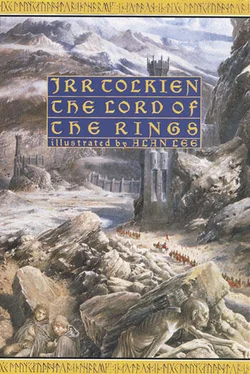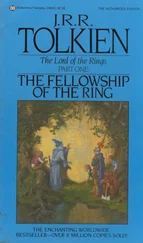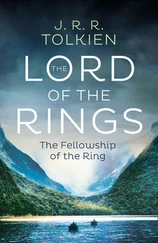OF MEN
The Westron was a Mannish speech, though enriched and softened under Elvish influence. It was in origin the language of those whom the Eldar called the Atani or Edain, ‘Fathers of Men’, being especially the people of the Three Houses of the Elf-friends who came west into Beleriand in the First Age, and aided the Eldar in the War of the Great Jewels against the Dark Power of the North.
After the overthrow of the Dark Power, in which Beleriand was for the most part drowned or broken, it was granted as a reward to the Elf-friends that they also, as the Eldar, might pass west over Sea. But since the Undying Realm was forbidden to them, a great isle was set apart for them, most westerly of all mortal lands. The name of that isle was Númenor (Westernesse). Most of the Elf-friends, therefore, departed and dwelt in Númenor, and there they became great and powerful, mariners of renown and lords of many ships. They were fair of face and tall, and the span of their lives was thrice that of the Men of Middle-earth. These were the Númenúreans, the Kings of Men, whom the Elves called the Dúnedain.
The Dúnedain alone of all races of Men knew and spoke an Elvish tongue; for their forefathers had learned the Sindarin tongue, and this they handed on to their children as a matter of lore, changing little with the passing of the years. And their men of wisdom learned also the High-elven Quenya and esteemed it above all other tongues, and in it they made names for many places of fame and reverence, and for many men of royalty and great renown. [95]
But the native speech of the Númenóreans remained for the most part their ancestral Mannish tongue, the Adûnaic, and to this in the latter days of their pride their kings and lords returned, abandoning the Elven-speech, save only those few that held still to their ancient friendship with the Eldar. In the years of their power the Númenóreans had maintained many forts and havens upon the western coasts of Middle-earth for the help of their ships; and one of the chief of these was at Pelargir near the Mouths of Anduin. There Adûnaic was spoken, and mingled with many words of the languages of lesser men it became a Common Speech that spread thence along the coasts among all that had dealings with Westernesse.
After the Downfall of Númenor, Elendil led the survivors of the Elf-friends back to the North-western shores of Middle-earth. There many already dwelt who were in whole or part of Númenórean blood; but few of them remembered the Elvish speech. All told the Dúnedain were thus from the beginning far fewer in number than the lesser men among whom they dwelt and whom they ruled, being lords of long life and great power and wisdom. They used therefore the Common Speech in their dealing with other folk and in the government of their wide realms; but they enlarged the language and enriched it with many words drawn from elven-tongues.
In the days of the Númenórean kings this ennobled Westron speech spread far and wide, even among their enemies; and it became used more and more by the Dúnedain themselves, so that at the time of the War of the Ring the elven-tongue was known to only a small part of the peoples of Gondor, and spoken daily by fewer. These dwelt mostly in Minas Tirith and the townlands adjacent, and in the land of the tributary princes of Dol Amroth. Yet the names of nearly all places and persons in the realm of Gondor were of Elvish form and meaning. A few were of forgotten origin, and descended doubtless from the days before the ships of the Númenóreans sailed the Sea; among these were Umbar, Arnach and Erech ; and the mountain-names Eilenach and Rimmon. Forlong was also a name of the same sort.
Most of the Men of the northern regions of the West-lands were descended from the Edain of the First Age, or from their close kin. Their languages were, therefore, related to the Adûnaic, and some still preserved a likeness to the Common Speech. Of this kind were the peoples of the upper vales of Anduin: the Beornings, and the Woodmen of Western Mirkwood; and further north and east the Men of the Long Lake and of Dale. From the lands between the Gladden and the Carrock came the folk that were known in Gondor as the Rohirrim, Masters of Horses. They still spoke their ancestral tongue, and gave new names in it to nearly all the places in their new country; and they called themselves the Eorlings, or the Men of the Riddermark. But the lords of that people used the Common Speech freely, and spoke it nobly after the manner of their allies in Gondor; for in Gondor whence it came the Westron kept still a more gracious and antique style.
Wholly alien was the speech of the Wild Men of Drúadan Forest. Alien, too, or only remotely akin, was the language of the Dunlendings. These were a remnant of the peoples that had dwelt in the vales of the White Mountains in ages past. The Dead Men of Dunharrow were of their kin. But in the Dark Years others had removed to the southern dales of the Misty Mountains; and thence some had passed into the empty lands as far north as the Barrow-downs. From them came the Men of Bree; but long before these had become subjects of the North Kingdom of Arnor and had taken up the Westron tongue. Only in Dunland did Men of this race hold to their old speech and manners: a secret folk, unfriendly to the Dúnedain, hating the Rohirrim.
Of their language nothing appears in this book, save the name Forgoil which they gave to the Rohirrim (meaning Strawheads, it is said). Dunland and Dunlending are the names that the Rohirrim gave to them, because they were swarthy and dark-haired; there is thus no connexion between the word dunn in these names and the Grey-elven word Dun ‘west’.
OF HOBBITS
The Hobbits of the Shire and of Bree had at this time, for probably a thousand years, adopted the Common Speech. They used it in their own manner freely and carelessly; though the more learned among them had still at their command a more formal language when occasion required.
There is no record of any language peculiar to Hobbits. In ancient days they seem always to have used the languages of Men near whom, or among whom, they lived. Thus they quickly adopted the Common Speech after they entered Eriador, and by the time of their settlement at Bree they had already begun to forget their former tongue. This was evidently a Mannish language of the upper Anduin, akin to that of the Rohirrim; though the southern Stoors appear to have adopted a language related to Dunlendish before they came north to the Shire. [96]
Of these things in the time of Frodo there were still some traces left in local words and names, many of which closely resembled those found in Dale or in Rohan. Most notable were the names of days, months, and seasons; several other words of the same sort (such as mathom and smial) were also still in common use, while more were preserved in the place-names of Bree and the Shire. The personal names of the Hobbits were also peculiar and many had come down from ancient days.
Hobbit was the name usually applied by the Shire-folk to all their kind. Men called them Halflings and the Elves Periannath. The origin of the word hobbit was by most forgotten. It seems, however, to have been at first a name given to the Harfoots by the Fallohides and Stoors, and to be a worn-down form of a word preserved more fully in Rohan: holbytla ‘hole-builder’.
OF OTHER RACES
Ents. The most ancient people surviving in the Third Age were the Onodrim or Enyd. Ent was the form of their name in the language of Rohan. They were known to the Eldar in ancient days, and to the Eldar indeed the Ents ascribed not their own language but the desire for speech. The language that they had made was unlike all others: slow, sonorous, agglomerated, repetitive, indeed long-winded; formed of a multiplicity of vowel-shades and distinctions of tone and quality which even the lore-masters of the Eldar had not attempted to represent in writing. They used it only among themselves; but they had no need to keep it secret, for no others could learn it.
Читать дальше
Конец ознакомительного отрывка
Купить книгу












